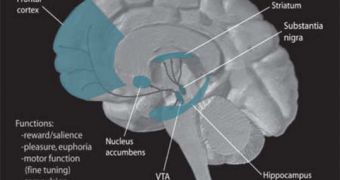Some of the most common drugs used to treat Parkinson’s disease have been demonstrated to cause poor impulse control in as much as 22 percent of people taking them. These findings have grave implications for the future, given the number of existing and potential patients.
Impulse control disorders are obviously an unwanted side-effect, and pharmaceutical companies may soon have to start redesigning their drugs so that they can no longer be linked with such disorders.
Researchers at the Mayo Clinic explains that the most common forms of medication used against this form of dementia are aimed at influencing the actions of the neurotransmitter dopamine.
Called dopamine agonists, this class of substances includes pramipexole (Mirapex) and ropinirole (Requip), which are both very often administered to Parkinson’s patients. The new study, a follow-up on an older investigation, is now challenging this habit.
Experts at the Mayo Clinic first reported the problem back in 2005. Their newest study, published in the February 2011 issue of the medical journal Parkinsonism and Related Disorders, reaffirms their initial conclusions, but also elaborates on them further.
Emotional, reward and hedonistic behaviors are all controlled by the limbic circuit in the brain, on which dopamine agonists have a direct influence. In one fifth of patients, taking the drugs results in impulse control disorders and compulsive behaviors.
The first category of effects includes pathological gambling and hypersexuality, whereas the other is characterized by excessive spending, binge eating, computer use, and hobbying.
The lead investigator of the new study, Mayo Clinic neurology fellow Dr. Anhar Hassan, says that a group of Parkinson's patients was studied for two years for this survey, PsychCentral reports.
“During this time, movement disorder physicians at Mayo Clinic were keenly aware that impulse control disorders could occur with these dopamine agonist drugs,” the expert explains.
“If they encountered a patient who was taking this drug, they asked them or an accompanying family member whether or not they had noticed any new type of behavior,” she goes on to say.
“What we found was that in as many as 22 percent of patients during that two-year period had a new onset impulse control disorder,” the scientist reveals. She adds that people who took high doses of dopamine agonists had a 33 percent chance of developing the unwanted side-effects.

 14 DAY TRIAL //
14 DAY TRIAL //